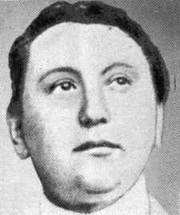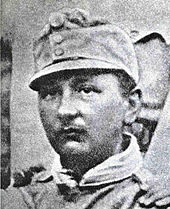Jaroslav Hašek
Jaroslav Hašek [ ˈhaʃɛk ] (born April 30, 1883 in Prague ; † January 3, 1923 in Lipnice nad Sázavou ) was a Czech writer who became famous primarily for his literary figure of the " good soldier Schwejk ".
Life
Jaroslav Hašek was born as the son of the high school assistant teacher Josef Hašek. He first attended high school, which he had to leave after the early death of his father in 1896. He began an apprenticeship in the Kokoška drugstore in Prague. When his teacher gave him notice less than a year later, he entered the newly established commercial academy and successfully completed it. At the age of 17 Hašek published his first poems and travel sketches, which until 1903 appeared mainly in the newspaper “ Národní listy ”. In 1902 he took up a position in the Prague bank "Slavia", which he lost after repeated unexcused absenteeism. From then on he devoted himself only to writing.
In 1904 Hašek joined the Czech anarchist movement , whose goals, according to today's understanding, were to be classified as left-wing extremists . At times there were conflicts with the law enforcement officers during various protests. In 1907 he became editor of the magazine "Komuna". In 1908 he gave up the ties to the anarchists because of his planned marriage to Jarmila Mayerová .
In the years 1908 to 1911 he wrote many humoresques for various magazines, e.g. B. Kopřivy (nettle), and karikatury . His writing style contradicted the literary convention of the time, he used the coarse and vulgar vernacular to an unprecedented degree for the time. That is why he was ignored by the literary scene at the time, which classified him in the category of "Gutter literature". Hašek himself also showed little respect for his manuscripts; he usually refrained from reading them after they went to press.
In 1910 he became editor of the magazine Svět zvířat (World of Animals), which he made briefly famous by publishing articles about invented animals. The spectacular discovery of a flea from prehistoric times, for example, caused a sensation in the professional world - Hašek corresponded with zoologists from all over the world. He also did not shrink from describing parrots who drink themselves to the point of unconsciousness and gave tips on breeding werewolves. After he had to give up this position because the reputation of the magazine was permanently damaged, he ran a dog trade by selling stolen dogs with forged pedigrees by hand.
He co-founded the Party for Moderate Progress within the Boundaries of Law , which in 1911 satirically commented on the election methods and phrases of the other parties. In his speeches in the Prague pub “Kravin” (cowshed), he called on behalf of his party “reasonable citizens who are aware that radicalism is harmful and that healthy progress can only be achieved slowly and gradually”, and others. a. the reintroduction of slavery, the nationalization of the caretakers and the promise of a pocket aquarium to the party's voters.
In 1912 his wife Jarmila gave birth to their son Richard Hašek.
In the First World War drafted into the Austro-Hungarian Army , Hašek served in the Bohemian Infantry Regiment "Freiherr von Czibulka" No. 91 on the Eastern Front . He allowed himself to be overrun by the Russians without resistance in order to be taken prisoner. In Russian captivity , he joined the Czechoslovak legions and then switched to the Red Army . He became political commissioner and joined the Communist Party of Russia in 1918 . In 1920 he returned to Prague with a Russian woman, without having been divorced from his first wife, Jarmila. He started work on his major work The Adventures of the Good Soldier Schweik during the World War . The novel initially appeared in weekly deliveries with a cover illustration by his friend Josef Lada . It should remain unfinished. Its author suffered from tuberculosis that he had acquired during the war and was additionally weakened by long-term heavy alcohol consumption. Jaroslav Hašek died at the age of only 39. His father had already succumbed to alcohol poisoning in 1896.
Hašek's main work was premiered on stage by his friend Emil Artur Longen in the early 1920s . In 1927 the authors Max Brod and Hans Reimann wrote a stage version of “Schwejk” (set design: George Grosz ), which the director Erwin Piscator premiered and which is played to this day (for example with Walter Plathe as Schwejk). Until his death, Hašek was only able to complete the first three parts of the novel; he breaks off in the middle of the fourth part. His friend Karel Vaněk then tried two more volumes, but they no longer achieved the quality of the original. Later there were further attempts to continue the success of the first publication in further works; However, there are no successes. The Schwejk material has been successfully filmed numerous times and edited for the stage or radio.
Eponyms
The asteroid (2734) Hašek was named after him in 1985.
Works (selection)
- Májové výkřiky (1903). [Poetry collection]
- Trampoty pana Tenkráta (1912).
- Dobrý voják Švejk a jiné podivné historky (1912).
- Průvodčí cizinců, (1913).
- Osudy dobrého vojáka Švejka za světové války (1921-23).
- Črty, povídky a humoresky (1955), collection of his stories.
- The most beautiful stories . Berlin 2009, ISBN 978-3-351-03265-4 .
- The extermination of interns from the Kobkán freight forwarding company . Stuttgart 2015, ISBN 978-3-15-011045-4 .
literature
- Gustav Janouch : Jaroslav Hašek. The father of the good soldier Schweik. Franke, Bern / Munich 1966.
- Cecil Parrott: The Bad Bohemian. The Life of Jaroslav Hašek Creator of the Good Soldier Švejk. The Bodley Head, London / Sydney / Toronto 1978, ISBN 0-370-10344-0 .
- Radko Pytlík (ed.): Jaroslav Hašek in letters, pictures and memories. (Original title: Lidský profil Jaroslava Haška , translated by Gustav Just , adaptations by Martin Remané). Structure, Berlin / Weimar 1983.
- Jan Berwid-Buquoy: Jaroslav Hašek and his “good soldier Schwejk” - Czech citizens, Austrian soldiers or Russian Bolsheviks? ReDi, Roma / Remscheid 2011, ISBN 978-3-86870-250-7 .
- Rolf Cantzen / Bodo Dringenberg: beers, animals, anarchy. Jaroslav Hašek - more than Schwejk . Launenweber, Cologne 2018, ISBN 978-3-9817920-9-6 .
Web links
- Literature by and about Jaroslav Hašek in the catalog of the German National Library
- Works by Jaroslav Hašek in the Gutenberg-DE project
- Jaroslav Hasek in the Internet Movie Database (English)
- Virtuální muzeum Jaroslava Haška and Josefa Švejka
supporting documents
- ^ Antonín Brousek: Afterword . In: Jaroslav Hašek: The adventures of the good soldier Švejk in the World War . Reclam, Stuttgart 2016, ISBN 978-3-15-960444-2 , pp. 963 f .
- ^ Cecil Parrott: Jaroslav Hašek. A study of Švejk and the short stories. Cambridge University Press, 1982, p. 11.
- ^ Antonín Brousek: Afterword . In: Jaroslav Hašek: The adventures of the good soldier Švejk in the World War . 4th edition. Reclam, Stuttgart 2016, ISBN 978-3-15-960444-2 , pp. 965 .
- ↑ Minor Planet Circ. 9768 (PDF)
| personal data | |
|---|---|
| SURNAME | Hašek, Jaroslav |
| BRIEF DESCRIPTION | Czech writer, author of The Good Soldier Schwejk |
| DATE OF BIRTH | April 30, 1883 |
| PLACE OF BIRTH | Prague |
| DATE OF DEATH | January 3, 1923 |
| Place of death | Lipnice nad Sázavou |




